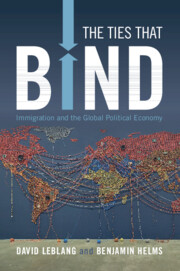3 - Destinations
Where Do Migrants Go?
Published online by Cambridge University Press: 02 February 2023
Summary
After deciding to exit, migrants can move to a range of potential destinations. Why do they choose one country over another? We again provide an overview of existing answers that identify economic factors – migration’s costs and benefits – and a migrant’s social network as the crucial variables driving destination choice. We instead highlight a destination country’s internal political environment and argue that migrants respond to the de jure and de facto political conditions that will shape life in their new home. These conditions include the bundle of citizenship rights and opportunities that destination countries confer, as well as the electoral success of anti-immigrant political parties and movements. Harnessing unique macro-level data in a gravity model of international migration, we find – for a set of wealthy destinations and then a global sample of countries – that these political factors exert a substantively important effect on migration flows from a wide array of sending countries.
Keywords
- Type
- Chapter
- Information
- The Ties That BindImmigration and the Global Political Economy, pp. 58 - 90Publisher: Cambridge University PressPrint publication year: 2023

